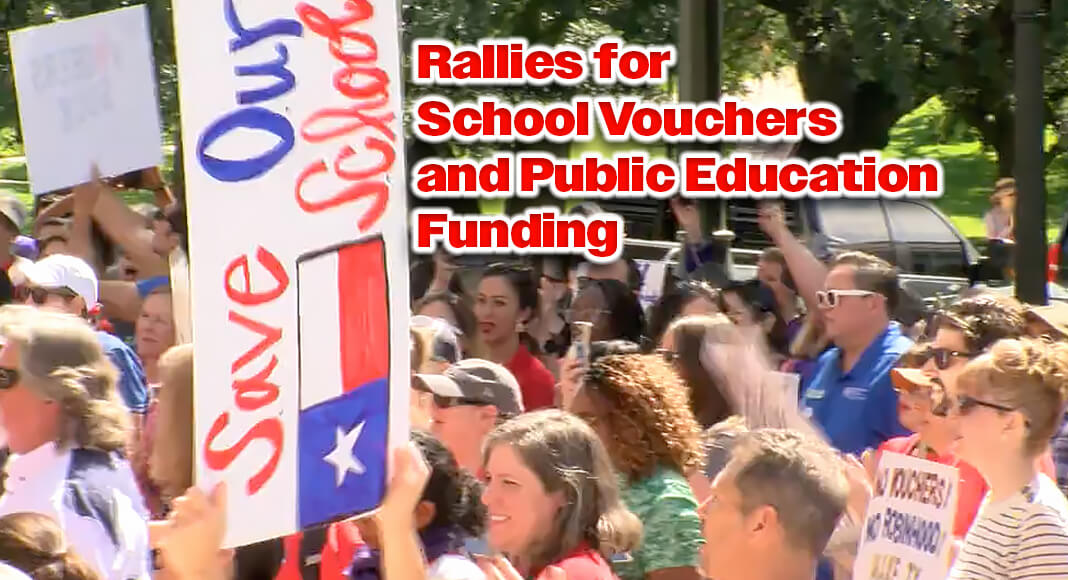
Texas Border Business
Texas Border Business
In early April 2025, teachers, parents, and community members across Texas organized rallies advocating for increased public school funding and opposing proposed school voucher programs. These events highlighted widespread concerns about the potential redirection of public funds to private institutions and the perceived underfunding of public education.
On April 5, 2025, hundreds gathered at the Texas Capitol in Austin to voice their opposition to the proposed school voucher program. Participants argued that vouchers would divert essential funding from public schools to private entities, potentially undermining the quality of public education.
U.S. Representatives Lloyd Doggett and Greg Casar addressed the crowd, criticizing both state and federal education policies. Doggett labeled the voucher initiative as a “radical move to incentivize parents to get their children out of our public schools,” while Casar described it as a “scam” and a “masquerade.” Both officials underscored the importance of resisting the proposed changes to safeguard public education.
These rallies occurred against the backdrop of legislative deliberations on House Bill 3, which proposes the implementation of education savings accounts—a form of school vouchers. Under this bill, students would receive approximately $10,000 annually from taxpayer-funded accounts to finance private schooling. Critics argue that this initiative could deplete public school resources and predominantly benefit higher-income families.
Educators and public school advocates contend that the state’s current funding levels have not kept pace with inflation, leading to larger class sizes and reduced services. To address these challenges, they are calling for an increase of $1,300 per student in the basic allotment.
The rallies in Austin and Fort Worth reflect a significant mobilization of educators, parents, and community leaders advocating for prioritizing public school funding over voucher programs. As the Texas Legislature continues to debate these issues, the collective voices of these stakeholders underscore the critical importance of adequately supporting public education to ensure equitable opportunities for all students.
Texas Governor Greg Abbott and Lieutenant Governor Dan Patrick have been prominent advocates for implementing school voucher programs in the state, aiming to allow public education funds to be used for private schooling options.
Governor Greg Abbott’s Position:
Governor Abbott has prioritized establishing a school voucher system, asserting that it would give parents greater choice in their children’s education. He has expressed confidence in securing sufficient legislative support to pass such a program, stating in November 2024 that the Texas House now has the necessary votes to approve the initiative.
In February 2025, Abbott actively promoted the voucher plan by visiting private schools across Texas, including stops in Athens and San Antonio. During these visits, he emphasized that “Texas must rank number one for educating our kids, and school choice is a path to achieving that goal” .
Lieutenant Governor Dan Patrick’s Position:
Lieutenant Governor Patrick has also identified school vouchers as a top legislative priority. In November 2024, he declared private school voucher legislation as his number one issue for the upcoming legislative session and urged Governor Abbott to designate it as an emergency item. Patrick emphasized that “there is absolutely no reason why Texas children and parents should be left behind” in accessing school choice options .
Legislative Developments:
The Texas Senate passed Senate Bill 2 in February 2025, proposing a $1 billion voucher program that would allocate $10,000 per student annually for private school tuition, with additional funding provisions for children with disabilities and homeschooling families . The bill’s progression reflects the concerted efforts of state leadership to advance the school voucher agenda.
The push for school vouchers has elicited mixed reactions. Supporters argue that such programs enhance educational opportunities and empower parents. Conversely, opponents, including some educators and public school advocates, contend that vouchers may divert essential funds from public schools, potentially undermining their quality and accessibility. This debate has led to significant public discourse and legislative scrutiny as Texas considers the future of its educational funding and policy frameworks.
The cost of educating a student per year in U.S. public elementary and secondary schools has notably increased. The average expenditure per pupil in the 2021–2022 school year was $15,633, marking an 8.9% rise from the previous year’s $14,358. This trend continued into the 2022–2023 academic year, with current expenditures per student reaching $16,281.
Projections for the 2023–2024 school year estimate that current expenditures per student will further increase by 2.7%, reaching approximately $16,722. These figures encompass instruction, support services, and other operational expenses.
It’s important to note that these are national averages, and per-student spending can vary significantly by state and district. Factors such as local funding levels, cost of living, and specific educational needs contribute to these variations.
In Texas, the cost of educating a student varies based on the specific metrics and sources considered. For the 2022–2023 school year, total public education spending was approximately $92.4 billion, averaging $16,792 per student. Operating expenditures amounted to over $68.1 billion, excluding capital expenditures, or about $12,389 per student.
It’s important to note that these figures can differ depending on the inclusion or exclusion of certain expenditures, such as capital outlays for facilities. Additionally, per-student spending can vary significantly across districts due to factors like local property tax revenues, student demographics, and specific district needs.














